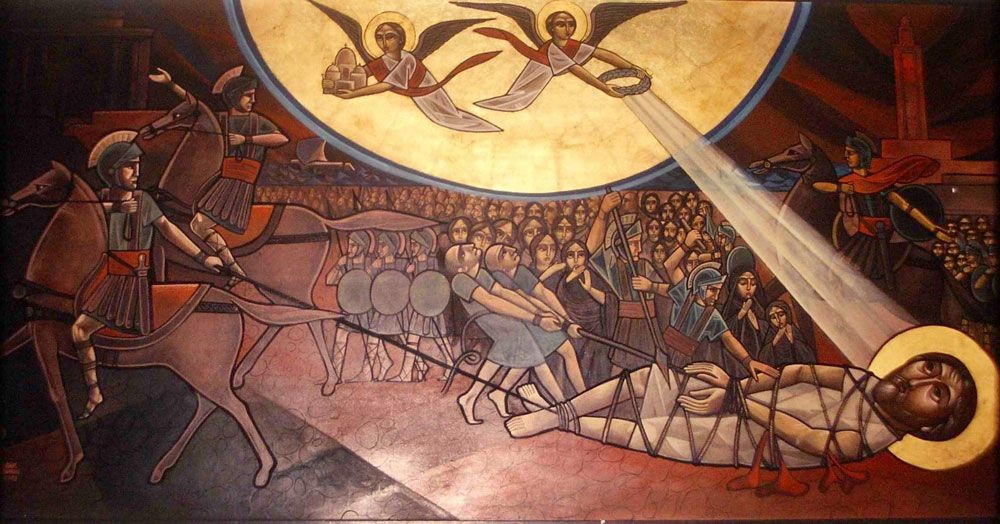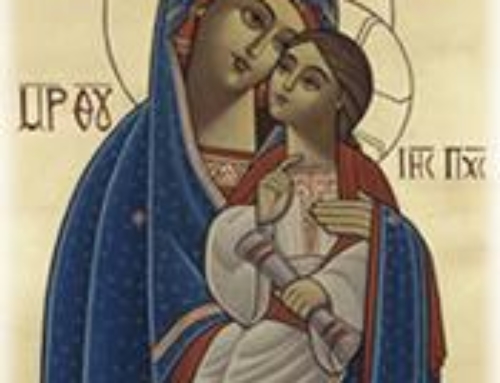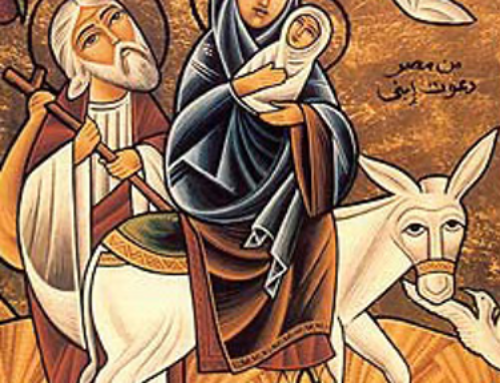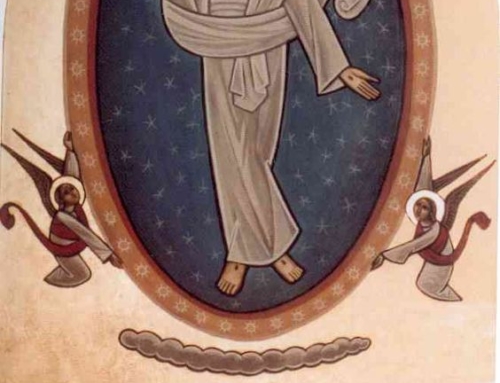Saint Mark – Evangelist, Apostle and Martyr
On this day, the 30th day of the Coptic month of Baramudah, we commemorate the martyrdom of the great Evangelist, Saint Mark, one of the Seventy Apostles chosen by the Lord, to whom we are indebted for bringing Christianity to Egypt.
Having spent some time in Pentapolis, his native country, establishing the Church there, Saint Mark was called by the Holy Spirit to preach the word of God in Egypt. So, in 61 AD, Saint Mark travelled around 500 miles to the city of Alexandria in Egypt, and upon entering the city, the strap of his sandal broke. Unable to walk much further, he looked for the nearest cobbler to mend it, and came across one called Anianus. And it happened that as Anianus was mending his sandal, his awl slipped and injured his hand, and from the pain he cried out “O the one God!” Saint Mark healed his hand and, seeing his belief in the one God, he began to preach to him the Christian Faith, and Ananias was converted to the Faith. Rather than the broken sandal strap being a hindrance to his mission, Saint Mark recognised that it was the Lord straightening the way for him to preach His Gospel according to His calling.
Saint Mark baptised Anianus and all his family. Anianus was the seed of the Christian Faith in Egypt, which, through the grace of God, began to grow, and thus the Church in Egypt was established. As the believers increased in number, some of the pagan men of the city became angry and plotted to kill him. However, upon learning of their evil plot, the Christian faithful implored Saint Mark to leave Egypt for a while, and so he ordained Anianus as bishop to oversee the Church, along with three priests and seven deacons, before then travelling back to Pentapolis to visit and tend to the Church he established there.
After about two years, Saint Mark returned to Egypt to find the Church had flourished under Bishop Anianus, and that they had built a church by the sea. They had also built houses for the poor, and the whole Christian community was fasting and praying together and had all things in common. However, the growth of the church had continued to infuriate the nobles of the city, and so in 68AD, when they learned of Saint Mark’s return to Egypt, they plotted again to capture and kill him.

St Mark Martyrdom Coptic
It so happened that year that the Feast of the Resurrection fell on the same day as the pagan feast of Serapis, and when all the pagan worshippers were congregated together in their temple, they were incited against Saint Mark. So, they stormed the church in the middle of the service, seized and bound Saint Mark, and dragged him through the streets of Alexandria until “the rocks were stained by his blood” as depicted in this beautiful icon at our church, written by Isaac Fanous. When evening came, they threw him into prison, still alive and thanking God, and while he was praying, an angel appeared to him to strengthen him. The next day, they dragged him again through the streets until his head detached from his body, and he thus received the crown of martyrdom.
Great is the honour of Saint Mark, for he endured persecution with thanksgiving, a powerful testimony to his unwavering faith in the Lord Jesus Christ. He planted with diligence where the Lord guided him, tending the church with care and devotion. It is for this reason that the Church of Alexandria became one of the great centres of Christian teaching, and from which came forth great teachers and leaders, such as Saint Athanasius the Apostolic, Saint Cyril the Pillar of Faith, Saint Dioscorus and countless others. Therefore, let us chant his doxology with thanksgiving, giving glory to God, saying:
Ⲁⲩϭⲓⲥⲙⲟⲩ ⲛ̀ϧⲣⲏⲓ ⲛ̀ϧⲏⲧⲕ: ⲛ̀ϫⲉ ⲛⲓⲫⲩⲗⲏ ⲧⲏⲣⲟⲩ ⲛ̀ⲧⲉ ⲡ̀ⲕⲁϩⲓ: ⲟⲩⲟϩ ⲛⲉⲕⲥⲁϫⲓ ⲁⲩⲫⲟϩ: ϣⲁ ⲁⲩⲣⲏϫⲥ ⲛ̀ϯⲟⲓⲕⲟⲩⲙⲉⲛⲏ.
“All the nations of the earth, were blessed through you, and your words have reached, the ends of the world.”
George Kamel







